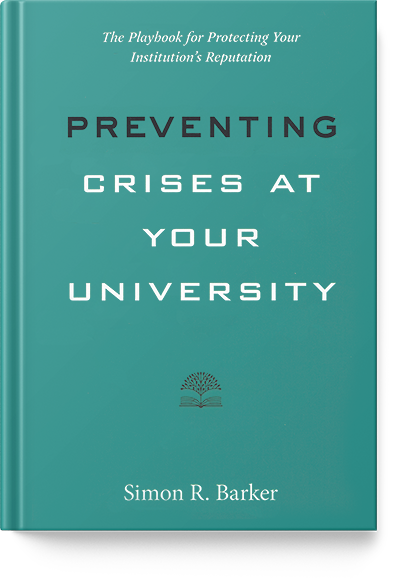“Mind the Gap” is a well-known warning for anyone who has traveled on the London Underground; it cautions any unsuspecting riders that there might be a gap between the platform and the doors of the carriage they are about to board or to leave. The gap, however, can be terrifying, particularly for an uninitiated traveler and is a typical British understatement of risk.
In Preventing Crises at Your University, Simon Barker demonstrates how critical it is for colleges and universities to align strategy and values with decision-making during times of crisis. Arguing that leaders must stop considering the discussion of reputational risk as unseemly, he demonstrates that this discussion is in fact a strategic imperative for every leader. Significant reputational damage, Barker asserts, is not the inevitable outcome of a crisis but of a poor response.
Defining a new crisis leadership playbook to deal with self-inflicted crises, Barker also:
- explains what typically goes wrong in a crisis;
- describes how to prevent crises from escalating;
- demonstrates how a stakeholder-centric model of communications can help mitigate reputational damage; and
- introduces a number of original concepts, including a Reputational Risk Management Framework, a Reputational Risk Maturity Model, and a Culture and Capability matrix.
Moving beyond the theoretical by presenting case studies of real crises involving sexual assault, freedom of speech, student protests, faculty misconduct, and a broad range of financial, social, and ethical issues, the book highlights and underscore key concepts around effective management of reputational risk. Ultimately, Preventing Crises at Your University serves as a wake-up call for all higher education leaders and board members.
Promo code: HTWN for 30% Discount

Praise for Preventing Crises at Your University
Simon Barker’s book is indispensable reading for every president and chancellor. It will be especially important for anyone coming into a leadership role, whether as an administrator or trustee, so that they can assess the capacity of their institution to deal strategically with reputational risk and respond wisely to whatever challenges may arise – and almost inevitably will arise – on their watch.
Ralph Hexter
Former Provost & Interim Chancellor, UC Davis
Former President, Hampshire College
With the introduction of new reputational risk frameworks and clarity around frequently confused concepts of crisis management, emergency management and issues management, Barker’s book provides clear insight into how to assess, mitigate and manage this most important, but nebulous of risks.
Cheryl Lloyd
Interim Vice President, Human Resources & Chief Risk Officer
University of California
The changing nature of “mainstream” and social media has fundamentally altered the way institutions and their boards need to think about reputational risk. Barker’s book defines the threat. It breaks down misconceptions about reputation, risk, and readiness. This book should give hope to every leader that it is possible to manage this fundamental risk – and thrive.
Frank Sesno
Director, School of Media & Public Affairs, George Washington University
Former CNN anchor & Washington Bureau Chief
This book should be part of the core curriculum for all higher education presidents and senior leaders. Barker makes a persuasive case for reputation management as a discipline worthy of investment, strategy, and rigor and an essential component of every institution’s comprehensive risk management strategy.
Binti Harvey
VP External Relations & Institutional Advancement, Scripps College
An engaging directive to think strategically about reputational risk management. Simon understands the complexities of the modern university and the need to manage issues before they escalate. Discipline, values, and above all, teamwork, must inform the process.
Leonard Raley
President and CEO, University of Maryland Foundation, Inc.
As a faculty member at Berkeley’s Executive Leadership Academy, Simon’s insight into how to strategically and proactively manage reputational risk has been both thoughtful and practical. This book should be read by anyone leading, or aspiring to lead a university.
Josefina Castillo Baltodano
Founder & Executive Director, Executive Leadership Academy
University of California, Berkeley